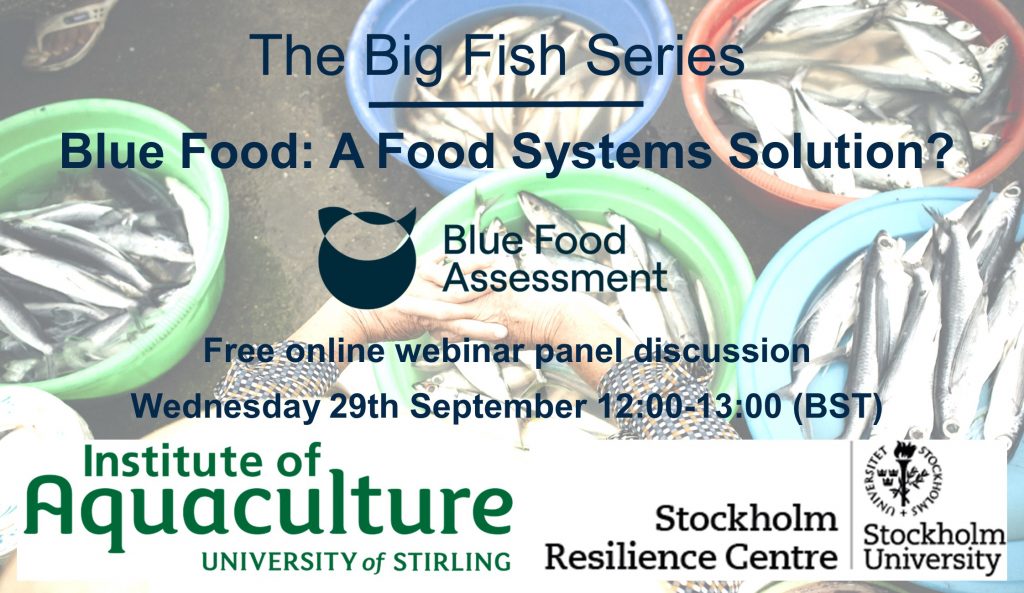
The Big Fish Series is a free online seminar series brought to you by the University of Stirling’s, Institute of Aquaculture. The purpose of this series is to highlight seafood’s roles in sustainable food systems.
‘Blue Food: A Food Systems Solution?’ is the first seminar kicking off the second series co-hosted by Stockholm Resilience Centre.
The Stockholm Resilience Centre, University of Stockholm is an international research centre on resilience and sustainability science and one of the leaders of the Blue Food Assessment.
The Blue Food Assessment (BFA) was recently launched as an international joint initiative bringing together over 100 scientists from more than 25 institutions. Led by the Stockholm Resilience Centre at Stockholm University, the Center for Ocean Solutions and the Center on Food Security and the Environment at Stanford University, and EAT, the Blue Food Assessment supports decision-makers in evaluating trade-offs and implementing solutions to build healthy, equitable and sustainable food systems.
The Blue Food Assessment presents an unprecedented review of the aquatic foods sector and has uncovered how fisheries and aquaculture can play a greater role in delivering healthy diets and more sustainable, equitable and resilient food systems around the world.
Five peer-reviewed papers on Nutrition, Environmental Performance, Climate Change, Small-Scale Fisheries and Aquaculture, and Demand highlight the opportunities to leverage the vast diversity of aquatic, or “blue”, foods in the coming decades to address malnutrition, lower the environmental footprint of the food system, and provide livelihoods.
The research projects that global demand for blue foods will roughly double by 2050, and will be met primarily through increased aquaculture production rather than by capture fisheries.
Investing in innovation and improving fisheries management could increase consumption even more and have profound effects on malnutrition. For instance, a “high growth” modelling scenario showed that increasing supply by 15.5 million tons (8%), causing a drop in prices, would reduce cases of nutrient deficiencies by 166 million, especially among low-income populations.
Blue foods were found to rank more highly than terrestrial animal-source foods in terms of their nutritional benefits and potential for sustainability gains. Many blue food species are rich in important nutrients. Compared to chicken, trout has approximately eight times more omega-3 fatty acids; oysters and mussels have hundreds of times more vitamin B-12 and five times more iron; and carps have seven times more calcium. The nutritional benefits of blue foods are especially important for women, who were found to benefit more than men from increased consumption in nearly three times the number of countries studied.
On average, the major species produced in aquaculture, such as tilapia, salmon, catfish and carp, were found to have environmental footprints comparable to chicken, the lowest-impact terrestrial meat. Small pelagic species like sardines and anchovies, bivalves and seaweeds all already offer lower stressors than chicken.
Further investments to improve the sector’s efficiency and reduce its environmental footprint can have sector-wide benefits, including for less commonly raised species like European bass, weakfish, flatfish, sea breams and milkfish.
The research found that blue food systems facing the highest risk from climate change are also typically located in those regions where people rely on them most and where they are least equipped to respond and adapt to climate hazards.
These five papers are the first in a series produced by the Blue Food Assessment (BFA), a group of more than 100 leading researchers led by Stanford University’s Center for Ocean Solutions & Center on Food Security and the Environment, the Stockholm Resilience Centre at Stockholm University and EAT.
This webinar opened with a short presentation outlining the Report synthesis of the Blue Food Assessment by Dr Beatrice Crona, Deputy Science Director and Associate Professor, Stockholm Resilience Centre. This was followed by a video mash-up of academic, industry and consumer views and an interactive discussion on the topic with a diverse panel of experts. The audience then had the opportunity to present questions to the Panel.
Further information can be found in the recently published research papers produced as part of the Blue Food Assessment, available online. A list of the BFA leadership team is also available here.